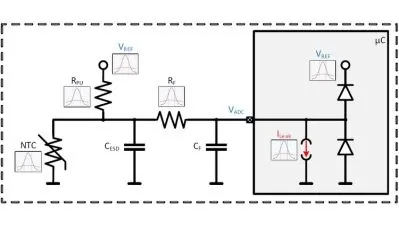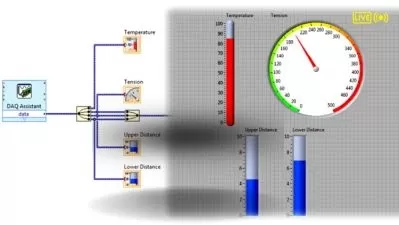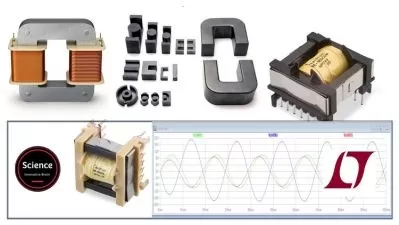Introduction to Electrical Engineering (British Lecturer)
Clever Professor
10:14:26
Description
Beginner friendly and easy to follow engineering principles
What You'll Learn?
- What electricity is and how AC and DC currents function
- Electrical components and their main applications: Diodes, Transistors, Resistors, Capacitors, LEDs, and Inductors
- How to build a simple electrical circuit and explain: Ohms law, Kirchhoffs Laws, Series and Parallel Circuits and Circuit Analysis
- Electrical test and measurement instruments and How to use them
- Electromagnetism, fields and forces, Faradays law, and principles of generators
- Understand power factor, power and energy their meansurement and calculations, and explain advanced tips to reduce energy bills
- How to use a soldering iron and explain professional techniques
- How to create circuits and more using a free software simulation
- How to complete the hands on project (radio, speakers or any other suggested project)
Who is this for?
What You Need to Know?
More details
DescriptionProfessor Tavassoli is a degree qualified in Electrical / Electronic Engineer and qualified lecturer with PGCE in Education. He has worked in some leading engineering industries from car manufacturing to food industries; from commissioning to optimising and improving their systems to managing men and machines, to training staff.Â
Having worked in England, Germany, South Korea, Middle East, and the USA he is a master in clear communication. Having also taught at various well-known Colleges, Universities, and training establishments around England, he has developed and delivered many post 16 high quality Engineering courses from basic fundamentals to Automation and Robotics. He's been instrumental in motivating students and colleagues to learn and strive for higher goals in their lives with their knowledge.
What's involved in this Course and what will I learn?
There are 9 on-demand video tutorial modules totalling 10 hours of solid and practical teaching with no fluff or nonsense spread over 28 videos including two example projects; This course gives the learner a good understanding of all the major components used in Electrical/Electronic Engineering world, what they are, their symbols and diagrams, their applications in electronic circuitries, how to measure them using test or measurement instruments, how to decipher their codes if any, how to read schematic diagrams, and finally how to build or assemble electronic circuits / kits, and even an introduction to troubleshooting technique.
By the end of this course; You should have an absolutely solid foundation in Electrical / Electronic Engineering.Â
Who is this course good for?
Anyone going onto an engineering field, whether that's Electrical, Electronic, Automation, Robotics, Mechatronics, Manufacturing, General Engineering, or other Engineering discipline, because there are a lot of crossover information between these fields, which you'll learn here that will be the foundational principles for any of these disciplines. Or anyone who simply wants to learn to be able to do their own electrical / electronic DIY projects.
What are the prerequisites of this course? Do I need to have any skills or knowledge to take this course?
There's absolutely no prerequisite to taking the course, and as long as you can understand the language used here in the course description, then you have all it takes to complete the course, and you could be 14 or 114 to take the course.
However, you might want to buy some tools and kits as suggested in the course to follow, but they are not essential.
This course has been designed for absolute beginners. No need to know engineering lingo. You'll learn what's important as you progress through each module.
This course DOESÂ NOT go into lengthy mathematical calculations, that is saved for a more advanced level of engineering in future courses.
Although there are some basic calculations for those who would like to stretch their potentials, but not essential, and all that could be done has been done to avoid unnecessary mathematics and use of formulae.
The Course Level Taught - This course is taught at collage level but would easily suite those in junior high or high school who have a desire to learn Engineering.
Method of Study;
The course is mostly delivered by video tutorials, which are all 100% illustrative including showing physical items, detailed written/drawn illustrations, simulations, hands on visuals & simple written explanations to convey the topics involved. Plus you will have access to extra curricular material for further studies.
How Long Is this Course?
This is an At-Your-Own Pace online course, where you will have access to all teaching videos as well as extra pdf materials to read at your own pace, so you can complete this course at your own speed, and there's no time limit to do so.
Is this Course Specific to any country?
No. This course teaches you the fundamentals of Electrical / Electronic Engineering and as such it's global. However, wherever necessary, any possible differentiations between countries have been considered and mentioned within the course.
What Can I Do Next?
Further improve your knowledge and skills by enquiring about our upcoming courses, or follow us.
Suggested Projects - The last four videos are specific hands on projects for you to make an electronic project that you can use. It will require soldering, and a project kit. It is SUGGESTED and not required to finish this course.
Have any further questions? Just let me know and I'll do my best to assist you.
To your success!
Fereidoon
Who this course is for:
- Absolute beginners wanting to excel in the field of Electrical Engineering
- This course would also benefits those interested in Mechatronics, and Engineering in general
Professor Tavassoli is a degree qualified in Electrical / Electronic Engineer and qualified lecturer with PGCE in Education. He has worked in some leading engineering industries from car manufacturing to food industries; from commissioning to optimising and improving their systems to managing men and machines, to training staff.Â
Having worked in England, Germany, South Korea, Middle East, and the USA he is a master in clear communication. Having also taught at various well-known Colleges, Universities, and training establishments around England, he has developed and delivered many post 16 high quality Engineering courses from basic fundamentals to Automation and Robotics. He's been instrumental in motivating students and colleagues to learn and strive for higher goals in their lives with their knowledge.
What's involved in this Course and what will I learn?
There are 9 on-demand video tutorial modules totalling 10 hours of solid and practical teaching with no fluff or nonsense spread over 28 videos including two example projects; This course gives the learner a good understanding of all the major components used in Electrical/Electronic Engineering world, what they are, their symbols and diagrams, their applications in electronic circuitries, how to measure them using test or measurement instruments, how to decipher their codes if any, how to read schematic diagrams, and finally how to build or assemble electronic circuits / kits, and even an introduction to troubleshooting technique.
By the end of this course; You should have an absolutely solid foundation in Electrical / Electronic Engineering.Â
Who is this course good for?
Anyone going onto an engineering field, whether that's Electrical, Electronic, Automation, Robotics, Mechatronics, Manufacturing, General Engineering, or other Engineering discipline, because there are a lot of crossover information between these fields, which you'll learn here that will be the foundational principles for any of these disciplines. Or anyone who simply wants to learn to be able to do their own electrical / electronic DIY projects.
What are the prerequisites of this course? Do I need to have any skills or knowledge to take this course?
There's absolutely no prerequisite to taking the course, and as long as you can understand the language used here in the course description, then you have all it takes to complete the course, and you could be 14 or 114 to take the course.
However, you might want to buy some tools and kits as suggested in the course to follow, but they are not essential.
This course has been designed for absolute beginners. No need to know engineering lingo. You'll learn what's important as you progress through each module.
This course DOESÂ NOT go into lengthy mathematical calculations, that is saved for a more advanced level of engineering in future courses.
Although there are some basic calculations for those who would like to stretch their potentials, but not essential, and all that could be done has been done to avoid unnecessary mathematics and use of formulae.
The Course Level Taught - This course is taught at collage level but would easily suite those in junior high or high school who have a desire to learn Engineering.
Method of Study;
The course is mostly delivered by video tutorials, which are all 100% illustrative including showing physical items, detailed written/drawn illustrations, simulations, hands on visuals & simple written explanations to convey the topics involved. Plus you will have access to extra curricular material for further studies.
How Long Is this Course?
This is an At-Your-Own Pace online course, where you will have access to all teaching videos as well as extra pdf materials to read at your own pace, so you can complete this course at your own speed, and there's no time limit to do so.
Is this Course Specific to any country?
No. This course teaches you the fundamentals of Electrical / Electronic Engineering and as such it's global. However, wherever necessary, any possible differentiations between countries have been considered and mentioned within the course.
What Can I Do Next?
Further improve your knowledge and skills by enquiring about our upcoming courses, or follow us.
Suggested Projects - The last four videos are specific hands on projects for you to make an electronic project that you can use. It will require soldering, and a project kit. It is SUGGESTED and not required to finish this course.
Have any further questions? Just let me know and I'll do my best to assist you.
To your success!
Fereidoon
Who this course is for:
- Absolute beginners wanting to excel in the field of Electrical Engineering
- This course would also benefits those interested in Mechatronics, and Engineering in general
User Reviews
Rating
Clever Professor
Instructor's Courses
Udemy
View courses Udemy- language english
- Training sessions 29
- duration 10:14:26
- Release Date 2024/09/17

















